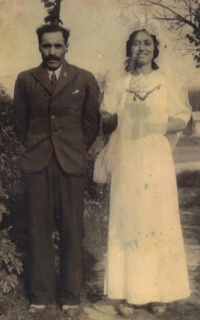I want the Roma to reconnected with their culture
Stáhnout obrázek
Čeněk Růžička was born October 28, 1946 in Liberec. He comes from an ancient Roma family that has been settled in the Czech lands from several centuries. Both his parents were interned in the concentration camp in Lety near Písek from 1942 to 1943, his mother Alžběta Růžičková was then deported to Auschwitz, father Jan ended up in the Dora concentration camp. Their relatives did not survive the Roma Holocaust. After the war the family lived a nomadic life until its official ban in the late 1950s. Since 1997 Čeněk Růžička has devoted himself to the commemoration of the Roma Holocaust. He has fought to remove the pig farm that stands in the place of the former Lety concentration camp. He engages in lecturing and exhibition work. He received the Alice Garrigue Masaryk Award from the US ambassador. He founded the Committee for the Redress of the Roma Holocaust. Čeněk Růžička died on December 9th, 2022.
